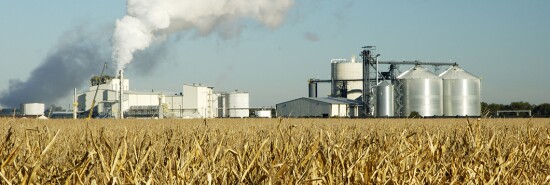
Ethanol industry says it will die if it cannot take farmers’ lands for a CO2 pipeline. Will Trump support them?
Timothy P. Carney
Video Embed
Iowa’s ethanol industry, which exists only because of federal and state subsidies and mandates, reportedly may collapse if it cannot build massive statewide networks of pipelines for distributing and burying the carbon dioxide emitted by its ethanol plants. These infrastructure projects would require taking farmers’ land through eminent domain.
This issue is bubbling up in Iowa politics, and it could even creep into the Republican presidential contest, which is already focusing on Iowa and Big Ethanol’s political favors.
BIDEN PLAYING WITH FIRE ON GAS STOVES AS ISSUE REIGNITES
Ethanol is an alcohol fuel made from corn or other plant matter. Its main use in the U.S. is as an additive to gasoline. When you fill up your tank in much of America, you are putting in a blend of about 90% gasoline and 10% ethanol.
Why do refiners add ethanol to gasoline? Mostly because Uncle Sam forces them to. The federal ethanol mandate, officially the Renewable Fuel Standard or RFS, effectively forces ethanol into our engines. Why would the government do this? To subsidize Iowa agribusiness, which is politically connected and politically powerful.
You might suspect that ethanol, as a plant-based alcohol, is an environmentally friendly fuel. It is not. Yes, the carbon dioxide emitted by burning ethanol is theoretically recaptured by the next crop of corn, but that tailpipe-to-cornfield carbon balance isn’t the only factor. For example, ethanol evaporates much more easily than gasoline, which is one reason the EPA restricts its summertime use. The federal Energy Information Agency writes: “These evaporative emissions contribute to the formation of harmful, ground-level ozone and smog. Gasoline requires extra processing to reduce evaporative emissions before blending with ethanol.”
Also, the tractors that plant, cultivate, and harvest the corn use fuel, and the factories that turn the corn into grain alcohol give off emissions — the very emissions that the ethanol industry claims it can capture and eventually sequester underground in liquid form.
Legendary ethanol giant Archer Daniels Midland, along with a few green-energy startups, has filed paperwork to build carbon capture and sequestration networks. These pipelines, according to the plan, would carry carbon dioxide around the state, liquefy the CO2, and store it underground forever. This would bring ethanol closer to being a zero-carbon industry.
Although many experts and scientists doubt this will work, it could be a very innovative solution to the problems caused by rising CO2 concentrations in the atmosphere. But as you might guess, building hundreds of miles of pipelines across Iowa means running pipelines across farmers’ lands.
“Summit and Navigator will seek right-of-way easements, both permanent and temporary, from landowners,” the Des Moines Register reports. “Permanent easements would be 50 feet.”
One problem with buying up easements for a pipeline is that it takes only a few holdouts — farmers who find their land more valuable to them than what the pipeline companies are willing to pay for it — to make your project a failure. That’s where the theft of land through eminent domain comes in.
Iowa state regulators currently have the power to take land from landowners for the sake of building pipelines.
State Sen. Jeff Taylor (R) has introduced bills “stripping state regulators of their ability to grant eminent domain powers for hazardous liquid pipelines to requiring pipeline developers to get voluntary easements from 90% of the landowners who live along the pipeline routes.”
If they don’t get this pipeline network, the companies say, the ethanol industry in Iowa will collapse. It’s not a new position for the ethanol industry: depending on big government for its profits.
So how does this play into GOP presidential politics?
CLICK HERE TO READ MORE FROM THE WASHINGTON EXAMINER
Donald Trump has long been a fan of giving the ethanol industry everything it wants. And he is very clear about why he does that: for popularity in the Iowa caucuses, which he lost in 2016. Trump is also a huge fan of eminent domain for corporate gain. Florida Gov. Ron DeSantis (R) has opposed ethanol’s corporate welfare agenda.
Will Trump keep up his crony capitalist record on this issue, or will the unpopularity of stealing farmers’ lands and the weirdness of carbon capture change his thinking?
